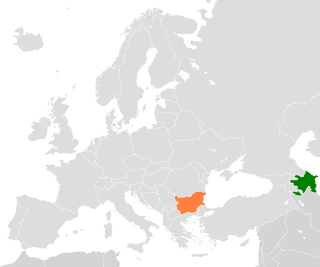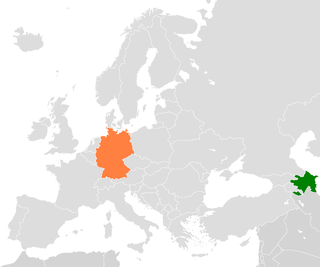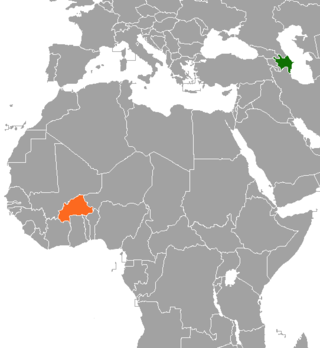
The Republic of Azerbaijan is a member of the United Nations, the Non-Aligned Movement, the Organization for Security and Cooperation in Europe, NATO's Partnership for Peace, the Euro-Atlantic Partnership Council, the World Health Organization, the European Bank for Reconstruction and Development; the Council of Europe, CFE Treaty, the Community of Democracies; the International Monetary Fund; and the World Bank.

In 1991, Azerbaijan recovered its independence from the Soviet Union, which was recognized by Greece on December 31, 1991. Diplomatic relations were established in 1992. The Greek embassy in Baku was opened in the spring of 1993. The embassy of Azerbaijan in Athens was opened in August 2004.

Strong foreign relations exist between the Republic of Azerbaijan and the United Kingdom. The Embassy of United Kingdom in Baku opened in 1992. The Embassy of the Republic of Azerbaijan in London opened in 1994. Both countries are members of the Council of Europe, the Organization for Security and Co-operation in Europe.

The diplomatic relations between Austria and Azerbaijan established in 1992 after Austria recognized the independence of Azerbaijan. Austria have an embassy in Baku. Azerbaijan has an embassy in Vienna. Both countries are full members of the Council of Europe.

Bilateral relations exist between the Republic of Azerbaijan and the Republic of Bulgaria in political, socio-economic, cultural and other spheres. Cooperation is carried out in such areas as transport and transit of goods, tourism, pharmaceuticals, agriculture, science and high technologies, education, military equipment, etc.

Azerbaijan–Japan relations are the bilateral relations between the Republic of Azerbaijan and Japan in the political, socio-economic, and cultural fields.

Diplomatic relations between Azerbaijan and Hungary were established a year after the former state's declaration of independence from the Soviet Union.

Diplomatic relations between the Republic of Azerbaijan and the People's Republic of China were established on April 2, 1992. The relations between the two countries have developed smoothly and high-level exchanges have been close. The PRC embassy in Baku openly commends Azerbaijan for supporting its stance on the political status of Taiwan, Tibet's sovereignty, the conflict in Xinjiang, and the suppression of Falun Gong. All political forces have actively advocated strengthening friendly cooperation with China. China was one of the first countries to recognize independence.

Diplomatic relations exist between Azerbaijan and the Netherlands. Azerbaijan have an embassy in The Hague. the Netherlands has an embassy in Baku. Both countries are full members of the Council of Europe. Azerbaijan celebrated its 30th anniversary with the Netherlands on April 1, 2022.

The diplomatic relations between Azerbaijan and Germany established in 1992 after Germany recognized the independence of Azerbaijan.

The diplomatic relations between Azerbaijan and Portugal were established in 1992 after Portugal recognized the independence of Azerbaijan.

Azerbaijan–Venezuela relations are the bilateral relations exist between Azerbaijan and Venezuela. Venezuela has an embassy in Baku. Azerbaijan is represented by its Permanent Mission to the United Nations in New York City.

Azerbaijan–Kenya relations refer to bilateral relations between Azerbaijan and Kenya. Kenya has a non resident ambassador in Tehran. The first and current resident Azerbaijani ambassador to Kenya is Sultan Hajiyev.

Bilateral relations exist between the Republic of Azerbaijan and the Republic of Burkina Faso in the diplomatic, cultural, socio-economic and other spheres. Neither country has a resident ambassador. Burkina Faso has a non resident embassy in Ankara.

Bilateral relations exist between Azerbaijan and Jordan. Cooperation between the countries is carried out in such areas as justice, tourism, defense, Information and communication technologies (ICT), transport, statistics, military affairs, standardization, emergency management, etc.

Bilateral relations exist between the Republic of Azerbaijan and the Republic of Colombia in political, socio-economic, cultural and other spheres.

Azerbaijan–Morocco relations are the bilateral relations between Azerbaijan and Morocco. Azerbaijan has an embassy in Rabat. Morocco has an embassy in Baku.

Azerbaijan—Lithuania relations refers to the bilateral relations between Azerbaijan and Lithuania. Both countries were Republics of the Soviet Union and are Post-Soviet states.

Azerbaijan–Ethiopia relations refer to bilateral relations between Azerbaijan and Ethiopia. Cooperation is carried out in such areas as economy, trade, education, culture, media, engineering, energy, and medicine. Azerbaijan has an embassy in Addis Ababa. Ethiopia has a non resident ambassador in Ankara.

Azerbaijan–South Africa relations refer to bilateral relations between Azerbaijan and South Africa.


























